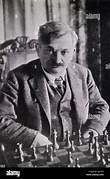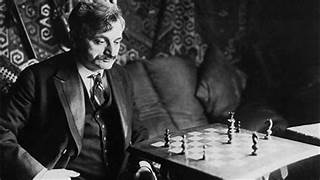 |
 |
 |
 |
Introduction
Emanuel Lasker, the second World Chess Champion, is a name that resonates deeply in the annals of chess history. Born on December 24, 1868, in Berlinchen, Prussia (now Barlinek, Poland), Lasker held the World Chess Championship title for an unprecedented 27 years, from 1894 to 1921. His contributions to chess theory, his innovative playing style, and his philosophical approach to the game have left an indelible mark on the world of chess.
Early Life and Introduction to Chess
Emanuel Lasker was introduced to chess at the age of eleven by his older brother, Berthold, who was a strong chess player himself. Recognizing Emanuel's talent, Berthold encouraged him to pursue the game seriously. Lasker's academic brilliance also shone early on; he excelled in mathematics and philosophy, disciplines that would later influence his approach to chess.
Rise to Prominence
Lasker's ascent in the chess world was swift. By the age of 20, he was winning local tournaments, and his reputation as a formidable player began to spread. In 1889, Lasker participated in the Breslau Tournament, where his strong performance caught the attention of the chess community.
In 1892, Lasker embarked on a tour of Europe and the United States, playing and defeating many of the leading players of the time. His string of victories, including triumphs over renowned players like Henry Bird and Joseph Blackburne, set the stage for his challenge to the reigning World Chess Champion, Wilhelm Steinitz.
World Chess Champion
In 1894, Emanuel Lasker challenged Wilhelm Steinitz for the World Chess Championship. At just 25 years old, Lasker defeated Steinitz decisively, winning the match 10-5 and becoming the second official World Chess Champion. This victory marked the beginning of Lasker's long and storied reign.
Lasker successfully defended his title in multiple matches, including against Steinitz in a rematch (1896-97), Frank Marshall (1907), Siegbert Tarrasch (1908), and Carl Schlechter (1910). His match against Schlechter was particularly notable for its dramatic conclusion, where Lasker won the last game to narrowly retain his title.
Innovative Strategies and Contributions
Emanuel Lasker was known for his deep understanding of the psychological aspects of chess. He believed that a player's state of mind was as important as their technical skill. This philosophy was reflected in his playing style, which was adaptive and often unpredictable. Lasker was willing to take calculated risks, employ unorthodox openings, and exploit his opponents' weaknesses both psychologically and strategically.
Lasker's contributions to chess theory are significant. He developed several opening systems, including the Lasker Variation of the Queen's Gambit Declined and the Lasker Defense in the Evans Gambit. His book, "Lasker's Manual of Chess," published in 1925, is considered one of the most influential chess books ever written. It provides insights into his thought process, strategic principles, and the psychological aspects of the game.
Beyond the Chessboard
Emanuel Lasker was not only a chess player but also a polymath with interests in mathematics, philosophy, and bridge. He earned a doctorate in mathematics from the University of Erlangen in 1902, and his work in the field included contributions to algebra and game theory.
Lasker also had a deep interest in philosophy, which is evident in his writings. He authored several books on philosophy and logic, including "Struggle," which explores the nature of competition and conflict. His interdisciplinary approach to intellectual pursuits enriched his understanding of chess and vice versa.
Notable Matches and Achievements
Lasker's career is punctuated with numerous notable matches and achievements. Some of the highlights include:
1. Victory over José Raúl Capablanca (1914): Although he lost the World Championship to Capablanca in 1921, Lasker's earlier victories against him in tournaments demonstrated his enduring prowess.
2. St. Petersburg 1914: Lasker won this elite tournament, ahead of Capablanca and Alexander Alekhine, further cementing his status as a top player even in his later years.
3. London 1899: Lasker's victory in this tournament, with a score of 19 points out of 21 games, is one of the most dominant performances in chess history.
Impact and Legacy
Emanuel Lasker's impact on chess is profound. His long reign as World Champion set a standard of excellence and resilience. His innovative approaches to chess strategy and psychology have influenced generations of players.
Lasker's contributions extend beyond his chess career. His interdisciplinary work in mathematics and philosophy, as well as his writings on chess, have enriched the intellectual and cultural landscape of the game. His legacy is not just that of a great chess player, but of a thinker whose ideas transcended the chessboard.
Personal Life and Character
Lasker was known for his integrity, humility, and intellectual curiosity. Despite his dominance in chess, he remained approachable and committed to advancing the game. He married Martha Cohn in 1911, and the couple shared a deep intellectual bond.
Lasker's life was also marked by challenges, including the turmoil of World War I and the rise of the Nazi regime, which forced him to flee Germany. Despite these adversities, Lasker's spirit remained unbroken, and he continued to contribute to chess and intellectual thought until his death in 1941.
Emanuel Lasker’s Contributions to Chess Literature
Lasker’s contributions to chess literature are invaluable. His books, such as "Lasker's Manual of Chess" and "Common Sense in Chess," provide timeless insights into the game's principles and strategies. These works continue to be studied and revered by chess enthusiasts and professionals alike.
Conclusion
Emanuel Lasker's legacy is one of unparalleled achievement and intellectual richness. As the longest-reigning World Chess Champion, he set a standard of excellence that remains a benchmark in the history of chess. His innovative strategies, psychological insights, and interdisciplinary contributions have left an indelible mark on the game and beyond.
Lasker's life story is a testament to the power of intellect, perseverance, and adaptability. He remains an inspiration to chess players and thinkers worldwide, embodying the timeless spirit of chess with his profound understanding and relentless pursuit of knowledge. Emanuel Lasker is not just a chess champion; he is a symbol of intellectual brilliance and enduring legacy.